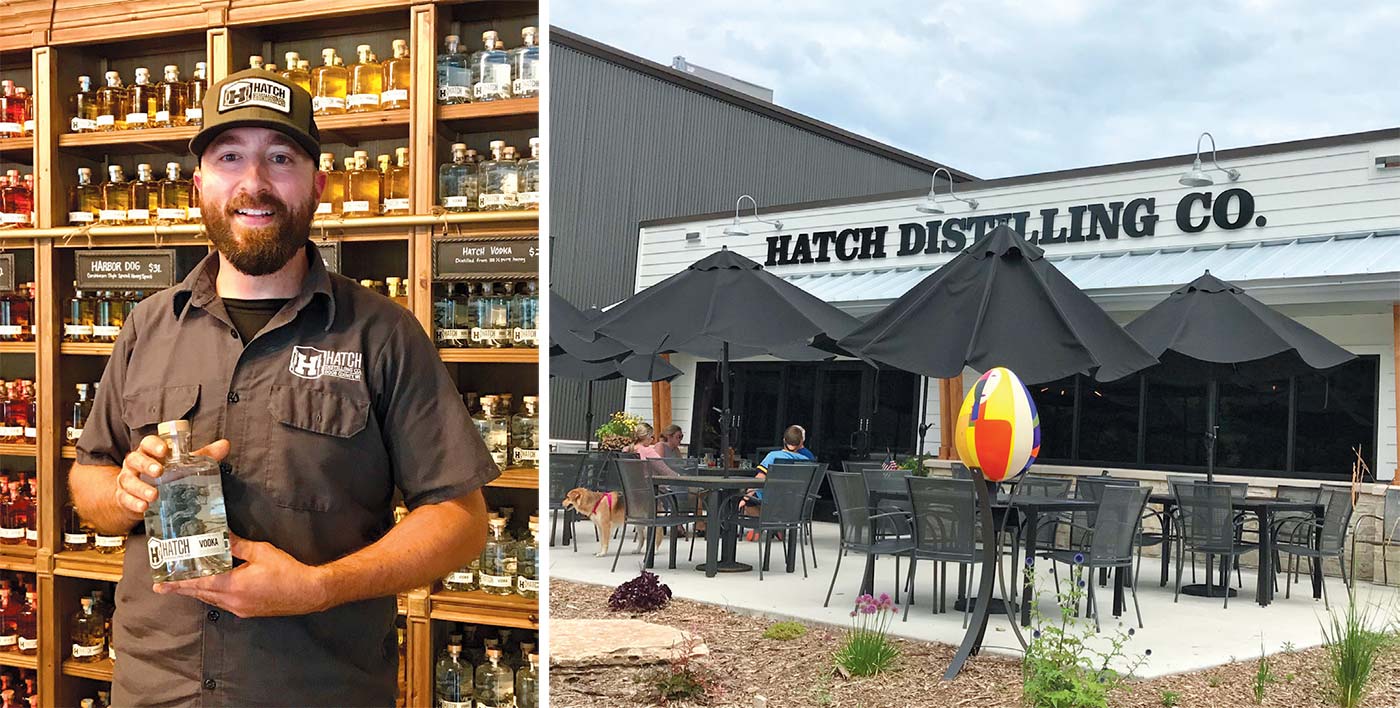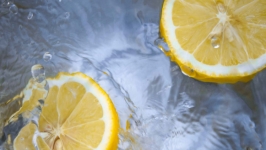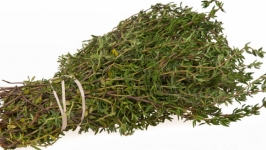HATCH DISTILLERY'S HONEY OF AN IDEA
edible Door archive from 2019 refreshed in 2024 for edibleNEW premiere
Grain farming’s at the root of many a delicious cocktail — corn, barley, rye or wheat forming a foundational ingredient for most of the stiffer liquors.
But at Hatch Distilling of Egg Harbor, which celebrated its first anniversary this summer, the brand owes a debt of gratitude not only to bushels of crops but to flocks of chickens and swarms of bees.
The cluckers did no less than inspire the small-batch distillery’s very name.
Meanwhile co-owner Chris Roedl, a hobby beekeeper before becoming a distiller, uses honey from his approximately 100 hives as a base for his line of clear spirits.
Gin and vodka — which for some taste buds go down as featureless at best, harsh and bitter at worst — get lightened up with the hint of honey. The rich fruit of nectar gives off the effect of sweetness without adding sugar — emphasis on “effect.”
“We definitely don’t put the honey into our clear spirits; we ferment the honey, and then make the spirits from the honey,” Roedl said. “It’s vodka (or gin) by every standard measure. But what happens is, one characteristic of the honey is that it tricks the part of the palate where you typically taste sweetness. It tricks the brain into tasting something sweet when you’re really not.”
As for those chickens ...
When plans for the new business were announced, an initial thought of mine was that it might be a venture of David G. Hatch, former owner/president of Hatco Corp. of Sturgeon Bay and one of the original developers of the city’s restored waterfront. Or perhaps it was the work of another notable David Hatch locally, the custom furniture artisan and musician from Ephraim.
Way off on both counts.
Roedl grew up in Lake Mills, Wis., where he worked on a poultry farm and eventually entered the profession himself, working for an industry giant with 20 million laying hens. In a video that plays on a loop off his tasting room, Roedl describes how “hatch day” was Christmas down on the farm, the chirping, newborn chicks symbolizing renewal and dawning life.
“In my vocabulary, I probably used the words ‘bird’ and ‘hatch’ more than anyone else in their lifetime,” he said.
IDEA TOOK FORM
Similarly, an entrepreneurial idea hatched in Roedl’s mind: an award-winning structure hatched along Egg Harbor’s vibrant Highway 42 corridor; and homemade, handcrafted liquor started hatching from the vats and silo-like chutes of his distilling room — the inner workings clearly visible from plentiful banks of windows.
The empty parcel Roedl zeroed in on was the long-ago home to a historic dance hall, Lena’s Sip & Chat, and later became a parking lot and home of the village farmers market.
Roedl had decided raising poultry was more of a first love than a career, so he started looking around and became chief operating officer of Door County Distillery, sister business of the landmark Door Peninsula Winery in Carlsville. His thoughts then turned to becoming a distillery owner himself, so he spent nearly six years researching the trade before taking the plunge with his co-owners, wife Emily and parents Russ and Linda. Russ Roedl, a vice president for Minneapolis cheesemaker Crystal Farms, provides an expertise in wholesaling. Chris delegates much of the production to lead distiller Caleb Despins.
Another of Hatch Distilling’s unique back stories is that it is as close to an organic operation as can be without the actual seal on the label.
Hatch gets its grains from a pair of organically oriented producers who follow sustainable farming practices: Chris Schuh of Door Karma Farms in rural Baileys Harbor; and the Bryan Haberli farm on County EE east of Egg Harbor. Roughly half of Roedl’s beehives are housed at Schuh’s farm, the rest on a friend’s property near Stevens Point.
“We really kind of stumbled into (the organic bent),” Roedl said. “Originally, our priority No. 1 was just to connect with local farmers, have them be able to take advantage of some of this income stream. The first farmer I called was Chris, because our wives work together.
“In my vocabulary, I probably used the words ‘bird’ and ‘hatch’ more than anyone else in their lifetime.” — Chris Roedl
“It turned out to be a good fit. Chris is one of the adventurous ones to consider us and take us on. Part of that is the inherent entrepreneurial spirit in organic farming. For a lot of farmers, it’s easier to just go to a mill and process (their grain) right away.”
However, some of the cropland involved is still making the transition to fully organic, so Hatch cannot promote its products as such. Nor can it use the “certified organic” name for the honey because “you have no control over where the bees visit,” Roedl said.
Visitors are more fascinated by the honeybees’ contributions than the notion of a green cocktail, he said.
“A lot of them hadn’t heard of something like this before; the honey, it just seems to be intriguing,” said Roedl, who can afford this twist because he doesn’t need to buy any bulk honey. “There are a handful in the U.S. who do it this way, but on a very limited basis. We’re one of the only ones I know of who are so heavily focused on the honey.”
Guests must wait a bit for the Hatch’s branded whiskeys, which take two years to age. A special apple brandy, which matures in about a year, will be ready in time for Egg Harbor’s massive Pumpkin Patch Festival in October. Roedl said his whiskey production has “hit its stride” at about 8 to 12 barrels a month. About 50 barrels’ worth percolated in the aging room as of late July.
While the whiskey and brandy cook, the core creations already available are the aforementioned gin and vodka; a limited-time rye outsourced from another distiller; straight bourbon with notes of sweetness, roasted caramel and toffee; Harbor Dog, akin to spiced rum but made from honey rather than sugar cane; and limoncello (lemon zest and honey added to the honey-based vodka, for a mashup of citrus acidity and Winnie the Pooh’s favorite treat).
The liquors sell in quart bottles for $28 to $40, with discounts ranging from $5 to $30 for larger purchases. For a preview, all six varieties can be sampled for $2 per half-ounce shot.
SEASONAL SPECIALTIES
A white-Formica, rectangle bar seats 20. For $9 to $10 per glass, it serves classics derived from Hatch brands (among them an old-fashioned, Tom Collins or bloody Mary incorporating jerk sauce from Jamaican Door of Sister Bay), plus 10 original recipes whose menu rotates seasonally by the availability of ingredients.
The autumn, for example, brings warm-the-cockles tastes of hot toddy and cinnamon type drinks. Debuting in the spring will be Hatch’s honey-heavy take on single-malt Scotch (it’s not claiming to be genuine Scotch, which by law and definition must be distilled in Scotland and matured there for at least three years in oaken casks).
A daily special goes for $9. On the day of Edible Door’s visit, the flavor du jour was a “lemon sharktini,” so named because the mixologist is a fan of Discovery Channel’s “Shark Week.” The martini blended the house vodka and limoncello with lemon juice and lemon slice, served up in a sugar-rimmed glass.
“If there was a surprise, it was that I expected the tasting room to be more of just that: where people would want a small sample and be more into the decisions about purchasing a bottle,” Roedl said. “I didn’t expect guests to spend as much time (socializing) here as they do; it’s much more of a craft cocktail bar, which is a good development (financially). But we’re not a ‘bar bar’; we don’t want to compete with the bars. We close at 8.”
There’s also indoor and outdoor seating for another 60 customers, including at a pair of hardwood tables and a sprawling upholstered couch along the front wall, with five opposing tables and chairs.
Guided 40-minute tours, at a cost of $20, are available at 11:15 a.m. Friday and Saturday.
Besides liquor, the shelves overflow with merchandise including T-shirts, baseball shirts and caps all with the Hatch logo; mixers and bitters, many hot Southern-styled; and the Jamaican Door jerk sauce.
“With the tourism here in Door County, I really saw how there was an opportunity for visitors to connect local agriculture with the end user,” Roedl said. “Our staff, we prioritize culture. We definitely are looking for creativity and an appreciation of the culinary world. That really does translate into what we do here.”







